Despite the fact that the tongue is a very important organ in human body, they remember about him, as a rule, only when he starts to get sick. Most often, pain appears on the side of the tongue, and if this happens, then you cannot ignore the problem. With such pain you need to contact a dentist, otolaryngologist or therapist.
Other causes of tongue burning
Although hormonal imbalance is the main cause of tongue burning in menopausal women, there are other causes of tongue burning including. DiabetesTabacilli Candida Dry Mouth Stomach Acid RefluxNondeficiencies Allergies Bad Oral Habits. Geographical languageThis diseaseDefectionChronic infectionsInflationary disordersLinal nerve damageRed malignant neoplasmsBlock anomalies Medicines. If pain or tenderness in your tongue, lips, gums, or other areas of your mouth persists for several days, see your doctor.
There are many reasons for pain in the tongue, they are very diverse and range from ordinary mechanical damage to the tissue of the tongue to cancer.
Hidden diseases of the body can also cause pain, because this organ reacts acutely and sensitively to any changes in health. Only a specialist can determine the true cause of the problem.
The doctor can find possible reasons and recommend treatment options. Continue reading to learn treatment options for tongue burning. Burning tongue sensation is a strange and uncomfortable symptom of menopause that can occur without warning. However, there are a number of things that can cause it, such as deficiency nutrients, hormonal imbalances, diabetes, certain medications and teeth grinding. Women can treat it with lifestyle adjustments and herbal supplements.
Causes of pain in the tongue associated with other organs
Because the burning tongue causes physical pain and discomfort, those who suffer from it often seek treatment. When exploring treatment options, it is important to start with the methods that carry the least risk and progress from there. Chewing sugar-free sugar can be an easy tongue burner.
Mechanical damage
Injury to the tongue is the most common cause of pain in it.
For example, banal biting of the tongue while eating or falling, and the person does not always notice it. But over time, this damage responds with sharp pain.
People with epilepsy often experience tongue pain because they bite it during seizures.
This means that lifestyle changes - the best place to start. Some simple tasks can relieve some of the discomfort from a burning tongue. Drink more water, for example, may stimulate saliva production and relieve some symptoms. It is better to avoid spicy foods, cinnamon and mint.
Typically, a combination of lifestyle changes and alternative medications will produce the best results. Alternative medicines can be different herbs and supplements or even methods such as aromatherapy. When looking for alternative medications, it is important to find a treatment that can balance hormone levels that target symptoms at the source.
The tongue can also be damaged by a piece of tooth enamel, a poorly ground filling, or an incorrect denture. The tongue may also hurt if it is burned by hot drink or food.
Inflammation
Pain in the tongue may indicate inflammatory diseases of the oral cavity, which are very dangerous for humans. As a rule, not only the patient’s tongue hurts, but also the palate and throat, and it hurts to swallow.
Finally, if a burning tongue persists, there are various medications and surgeries that can be explored. Medications are often prescribed simply to deal with a burning tongue, but do nothing to treat the source of the problem. This final option also comes with the most risks and side effects.
Combinations of lifestyle changes and alternative medications are most effective. A burning tongue is one of the rare symptoms of menopause transition. However, there are many different things you can do to relieve the pain.
The tissues of the tongue can also become inflamed - this disease is called glossitis and is caused by viruses or bacteria. Inflammation of the tissues of the tongue can be caused by mechanical damage or a chemical or thermal burn.
Glossitis is divided into the following types:
- ulcerative- not only the tongue hurts, but also the entire oral cavity, which is covered with small bleeding ulcers, and the gums swell;
- catarrhal- the tongue hurts on the side, the sense of taste of food disappears, salivation increases. such glossitis is caused by oral candidiasis, stomatitis, burns and injuries;
- purulent-phlegmous- the most severe type of glossitis with unbearable pain, high temperature bodies and vomiting.
Nasopharyngeal disease
Viral and bacterial diseases of the nasopharynx are another reason why the tongue hurts at the base.
Burning tongue is a condition that causes soreness, pain and burning in the mouth, gums and tongue. This condition is most common in postmenopausal women because it is associated with decreased hormone levels. This article outlines several specific foods to avoid, especially when the goal is to avoid further damage by burning your tongue after eating.
Although the exact cause of tongue burning is not yet fully understood, it can be caused by stress or injury, and may also be a symptom of an underlying condition. One of several reasons may be behind this painful symptom, such as hormonal fluctuations during menopause, oral infections, and certain types of medications.
The doctor can determine that the infection is coming into the oral cavity from the nasopharynx by the enlarged sublingual lymph nodes.

Pharyngitis (inflammation of the pharynx) and laryngitis (inflammation of the larynx) are often accompanied by pain at the base of the tongue.
There are many reasons for this, such as hormonal fluctuations of menopause, oral infections and certain types of medications. It has many causes beyond menopause, including allergies, stomach problems, and some types of vitamin deficiencies. Although this is often called "the most strong muscle in the body,” it consists of a group of muscles that allows us to eat food, swallow and speak. The healthy one is pink and covered with small nodules called papillae.
Since you constantly use your tongue, it can be unpleasant and uncomfortable to experience, including discoloration and soreness. There are many reasons for a number of common tongue symptoms. Luckily, most of them are not serious and most can be resolved quickly.
Stomatitis
A disease in which the tongue not only hurts, but also stings, is stomatitis.
Sometimes it affects not only the surface of the tongue, but also the entire mucous membrane of the oral cavity.
Stomatitis is an unpleasant medical problem, accompanied by severe pain, causing serious discomfort to the patient and interfering with normal food intake.
What to do and how to deal with pain?
In some cases, however, a discolored or painful tongue may indicate more serious conditions, including vitamin deficiencies, or. For this reason, it is important to seek medical care, if you have problems with your language. There are a number of things that can cause a whitish coating or white patches to appear on the tongue, including.
What causes a red or strawberry tongue?
This, in turn, leads to the formation of white spots inside, including on the tongue. Leukoplakia can develop when the tongue is irritated and is common in people who use the products. The condition results in white patches that often represent cottage cheese, as in consistency on the surfaces of the mouth and tongue. Oral thrush most often occurs in infants and older adults, especially denture wearers, or in people with weakened immune systems. Oral thrush is more likely to occur after use, which can kill the "good" bacteria in the mouth. Use plain yogurt with a live and active culture can help restore proper fauna in the mouth. In addition, it can be used to fight infection. A sign of this condition may be a network of raised white lines on your tongue with a lacy appearance. Doctors often cannot pinpoint its cause, but it usually gets better on its own. There are some things you can do that may help: Practice good dental hygiene, avoid tobacco, and cut down on foods that irritate your mouth.
- This condition results in excessive cell growth.
- Although not dangerous in itself, leukoplakia can be a precursor.
- Therefore, it is important to have your dentist determine the cause of the white spots on your tongue.
- Also known as oral, which develops internally.
- People with people who have or may get thrush.
Photo: Stomatitis - herpetic (left) and aphthous (right)
Stomatitis can be bacterial, viral and candidal; in the latter case, the oral cavity is covered with a white cheesy coating.
Inflammation of the salivary gland
The salivary gland located next to the tongue can become clogged and inflamed, leading to pain in and under the tongue. Inflammation of the salivary gland is accompanied by general soreness of the entire oral cavity and a constant feeling of discomfort.
What causes a black hairy tongue?
In some cases, the tongue may even exhibit a strawberry appearance with enlarged, red taste buds dotting the surface. This condition, also known as, is named for the pattern of reddish spots that develop on the surface of the tongue. Sometimes these spots have a white border around them, and their location on the tongue may change over time. Although it is usually safe, you should contact your dentist to have red spots that have lasted longer than 2 weeks examined. Once the dentist has determined that the redness is the result of geographic tongue, no further treatment is required. If the condition makes your tongue sore or uncomfortable, you may be prescribed a topical to relieve the discomfort. This disease, usually seen in children under 5 years of age, affects blood vessels in the body and can cause strawberry tongue. During the severe phase of the disease, children are often overexposed and may also have redness and swelling in the arms and legs.
- People who get this infection may develop strawberry tongue.
- Be sure to see a doctor immediately if your tongue is high and red.
- Treatment with antibiotics is necessary.
Neuralgia
Neuralgic problems make diagnosis very difficult because the causes are difficult to detect.
With neuralgia, pain can be both severe and insignificant, both constant and occurring periodically, which further complicates the determination of the reasons for its occurrence.
The most common neuralgic problem that causes pain in the tongue is glossalgia. This disease occurs as a result of endocrine system failures, neurogenic disorders, mental trauma or severe stress.
What Causes Pain or Rough Tongue?
People who are or will get it, as well as people who are more likely to have it. There are many things that can make your tongue hurt or cause painful bumps, including. Accidentally biting your tongue or scalding it on something straight out of the oven can result in a sore tongue until it heals. Grinding or squeezing can also irritate the sides of the tongue and cause it to become painful. Headache is a rather unusual occurrence. They can occur either acutely or chronically and are often associated with other symptoms.
Glossalgia is characterized by:
- complete or partial numbness of the tongue,
- burning,
- tingling,
- rapid fatigue of the tongue when speaking.
Sometimes not only the tongue hurts, but also the lips, it occurs headache.
Glossalgia mainly occurs in women between 25 and 30 years of age. You need to start fighting the disease as early and quickly as possible, because it is difficult to treat.
Pain after puncture
Itching, tingling, numbness, soreness, or a swollen tongue are typical. Dry mouth or throat and loss of taste are often mentioned. Most sufferers describe tongues as burning or sharp. Often the symptoms are mild at the beginning of the day and gradually increase. It is possible that the tongue pain has spread to other areas of the head and neck. Sore throat, headache or toothache in many cases accompanied by symptoms of progressive tongues. There may also be a decrease in appetite and increased salmon production.
But sometimes pain in the tongue is caused by simple irritation of the nerves in it. This may occur due to a lesion nervous system, nerve damage during surgical interventions in the area of the larynx and organs of the neck and oral cavity.
Irritation of the nerves can also be associated with pathologies of organs adjacent to the tongue, most often the teeth, i.e. due to dental problems. Neuralgia of the lower branch of the trigeminal nerve also gives off severe pain into the tongue.
Whether the pain affects the entire tongue or just specific areas depends on the individual case. Tongue pain is especially common at the tip and sides of the tongue. The entire oral mucosa may also be affected, which then usually burns or becomes inflamed. Often, upon closer inspection, the inflammatory heart is visible on the tongue or on the oral mucosa. If tongue tingling occurs more frequently, lastingly or for no apparent reason, a doctor should be consulted in any case to clarify the cause.
Video: what a neuropathologist says about this
Allergy
A common cause of pain is allergic reactions for food or medicine (mainly antibiotics).
Eliminating allergenic foods, the most common of which are pineapple, kiwi, seeds, and alcohol solve the problem of tongue pain. It's the same with medications.
The causes of tongue pain can be varied and are often quite harmless and easy to treat. Particularly typical are areas of inflammation of the tongue or oral mucosa. In this case, a red or swollen spot can usually be found as an inflammatory heart. However, inflammation can develop subliminal and may not always be visible to the naked eye.
Irritation from tobacco smoke
Likewise, tongues are caused by trauma to the tongue, such as bites, bruises, or eating too hot or cold food. Eating too much food can also irritate the tongue, which is painful. IN severe cases Swelling or even inflammation of the tongue or oral mucosa may occur due to eating too much food. Tooth decay and tartar, or damaged parts of teeth and dentures, can also cause damage to the tongue.
Hot spices and smoking only aggravate the allergic reaction, so you should avoid them too. Allergies in the mouth can manifest themselves in the form of fungal infections or stomatitis.
Video: what is important to know about allergies?
Oncology
The most serious problem, due to which the tongue may hurt - cancer.
In this case, complaints are received that the tongue hurts from the inside.
Unfortunately, in the early stages of oncology there are no unpleasant sensations. Pain indicates that the tumor is already at an advanced stage.

Oncological diseases of the tongue are treated by an oncologist, to whom the patient is immediately sent from the office of a dentist, therapist or otolaryngologist.
Video: Oral cancer
Treatment
The diagnosis will allow us to find out the cause, and only after that the doctor will decide how to treat the disease.
Conventionally, treatment methods can be divided into official, prescribed by a doctor, and traditional, not recognized by medicine.
Medication
Medicines are mainly prescribed if the cause is stomatitis.
In this case, the patient is prescribed a course of antibiotics, and the oral cavity is additionally treated with antiseptics, for example, Chlorhexidine or Miramistin.
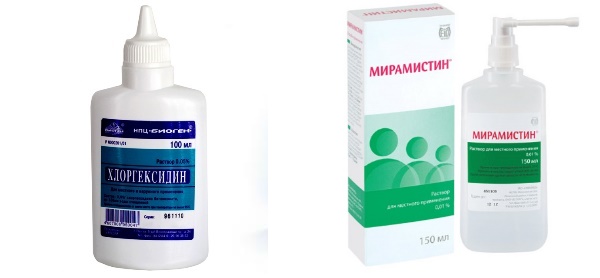
Other problems can be solved either by eliminating the source of the problem or by treating a specific disease. Only a doctor can prescribe antibiotics and antiseptics.
Folk remedies
To measures to reduce pain in the tongue, in folk medicine primarily include remedies for stomatitis, which is common cause pain in the tongue.
So, for treatment, unofficial medicine advises rinsing your mouth with diluted alcohol tincture of propolis, soda solution or decoctions of medicinal herbs.
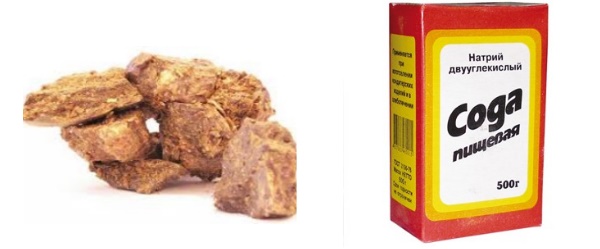
Decoctions of chamomile, common thyme (thyme), oak bark, and sage are effective.


Prevention
For prevention it is advisable to:
- stop smoking
- give up spicy, sour and salty foods, alcohol;
- start taking vitamins, especially vitamin A.
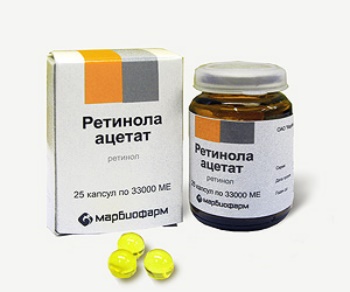
In order to prevent pain, it is better not to pierce this area. After all, during the piercing procedure, an infection can be introduced into the tongue and oral cavity.
Piercing damages the nerve endings in the tongue a large number of, and the pain can become chronic.
It is necessary to pay attention to oral hygiene and brush your tongue along with your teeth. Diseases of the upper respiratory tract should not be neglected; you should contact a therapist or otolaryngologist for their treatment, since self-medication is fraught with the appearance of chronic diseases.
Photo
You can see what a diseased tongue looks like in the photo.
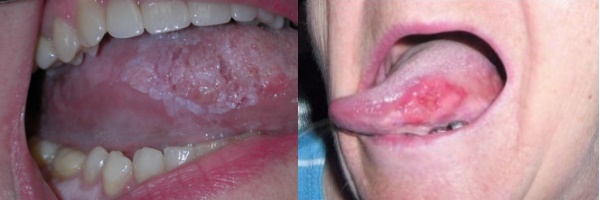
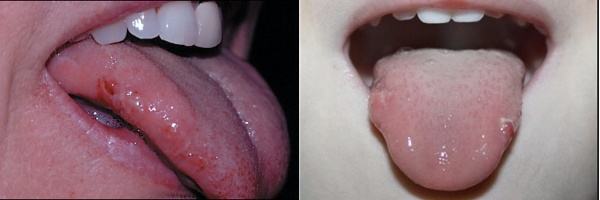
Photo: Tongue injuries due to biting
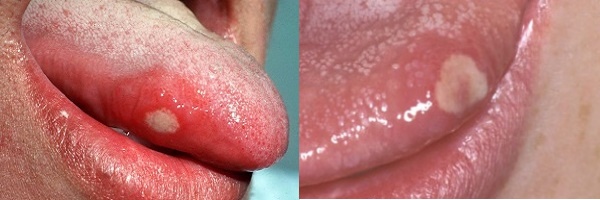
FAQ
After the holidays, my tongue is coated and hurts on one side, what is the reason for this?
Most likely, this was due to an allergy to increased alcohol consumption.
Why does my tongue hurt after tooth extraction?
Tooth extraction is inevitably accompanied by temporary swelling of the gums, which can also affect the tongue. In addition, the dentist may accidentally injure the tongue on the side during his manipulations.
What to do if a child’s tongue hurts?
Children may complain of a sore mouth or refuse to eat without giving a reason. Parents should realize that this indicates a pain in the tongue and take the child to the doctor.
The causes of pain in children are the same as in adults, but the problem itself is more common in children. This happens because children constantly put something dirty in their mouths and are prone to biting their tongues. Stomatitis also often occurs in children.
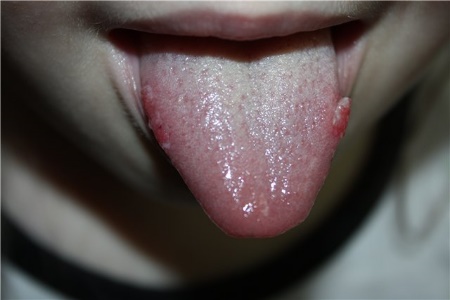
Prescribe treatment for a child, as well as determine the real reason problems should be solved by a doctor. But before visiting his office, it would not be superfluous to disinfect the child’s oral cavity by rinsing it with a soda solution.
It is impossible to ignore the pain, if only because it may be caused by an inflammatory process. Failure to treat any kind of inflammation in the body can lead to serious complications in the future. You can start visiting doctors with this problem from a therapist, who will redirect the patient to the necessary specialist.
The causes of tongue pain can be very diverse, ranging from mechanical damage to the presence of cancer. Most often, pain occurs for the following reasons:
- presence of mechanical damage;
- development of inflammatory processes;
- various allergic reactions;
- development of neuralgia;
- the presence of hidden diseases of other organs of the human body;
- blockage of the salivary gland;
- presence of cancer.
The most common cause of pain on the tip or sides of the tongue is mechanical damage. Most often, the patient receives such injuries during eating, and they include biting, burns, scratches and cuts. The tongue can also be injured by chipped tooth enamel, an uncomfortable denture, or an unscrupulously installed filling with sharp edges. Constant, even minor injury can lead to long-term pain.
Inflammatory diseases of the oral cavity are dangerous and painful. If a patient has a sore tongue, throat, palate, and it hurts to swallow, the doctor has every reason to suspect the presence of inflammatory processes in the oral cavity. They may be caused viral diseases nasopharynx, as a result of which the patient's sublingual lymph nodes become enlarged. In this case, the patient complains of pain when swallowing at the base of the tongue. With such symptoms, you should consult an otolaryngologist, since the cause of pain in the tongue may be acute purulent tonsillitis, which requires immediate medical treatment.
Another cause of pain is viral stomatitis. It affects both the surface of the tongue and the entire mucous membrane of the oral cavity. The disease is painful, causes difficulty in eating, and causes discomfort to the patient.
Often the causes of pain in the tongue lie in the presence of an allergic reaction in the patient. This could be an allergy to food or medications. Typically, the patient complains of tongue pain after eating, especially after kiwi, pineapple, seeds, drinking alcohol, and also after smoking a pipe and cigarettes.
Most often, an allergic reaction is expressed in the form of stomatitis or fungal diseases. Consumption of spicy food and alcohol only aggravates the painful condition. Discontinuation of those drugs and products that cause an allergic reaction leads to the disappearance of allergy symptoms.
Neuralgic diseases usually significantly complicate correct diagnosis; in this case, it is difficult to determine why the patient’s tongue hurts. The most common neuralgic disease is glossalgia. It occurs as a result of malfunctions of the endocrine system, as a result of neurogenic disorders, and also as a reaction to mental trauma or severe stress. With glossalgia, partial or complete numbness of the tongue, tingling, burning, and rapid fatigue of the tongue when speaking are observed. Often with glossalgia, the lips also hurt; the patient complains that he has a headache and a numb tongue.
Another reason for the appearance of pain in the tongue is the presence of hidden diseases of other organs and systems in the patient. The tongue reacts sharply to any changes in the condition of the body, and the result of infectious diseases of the body can be glossitis - inflammation of tissues.
Pain can also be caused by diseases gastrointestinal tract, cardiovascular and endocrine systems, as well as the presence of anemia in the patient.
A blockage in the salivary gland, which is located near the tongue, can also lead to pain. In this case, the patient complains of pain under the tongue, constant discomfort and soreness of the oral cavity.
The most serious cause of tongue pain is cancer. In this case, patients complain of pain inside the tongue. In the early stages of cancer, there may be no pain at all; it usually appears in later stages. The treatment of oncological diseases is carried out by an oncologist, to whom both a general practitioner and a dentist can refer if there is a suspicion of oncological disease.
Pain after puncture
IN Lately It has become fashionable to pierce the tongue, it is called piercing. We will skip moralizing on this topic and tell you briefly what this threatens.
Many patients complain that they have long time Tongue hurts after puncture. This is considered normal, since a puncture, even the most skillful one, is a kind of injury that takes time to heal. In addition, the tongue is literally riddled with nerve endings, so the puncture site hurts especially strongly. It is impossible to say exactly how long the pain continues after the puncture; this happens individually for everyone: for some, the pain stops 2-3 days after the puncture, for others the pain lasts for 10-12 days. If your tongue is swollen and painful immediately after the piercing, this is normal. However, severe pain and swelling should gradually subside and disappear completely 4-5 days after the puncture. If the pain does not subside after a week or is acute and throbbing, you should immediately consult a doctor, as the possibility of infection cannot be ruled out.
Causes of pain after piercing:
- damage resulting from puncture of nerve endings located in the tongue;
- infection in the wound and development of the inflammatory process;
- allergy to the metal from which the jewelry is made.
In order to prevent the development of complications, you should contact only professionals. After all, not every cosmetologist knows how to properly pierce the tongue without damaging the nerve or developing inflammatory processes. If, after the piercing, the pain when speaking and swallowing does not go away, you should consult a dentist or surgeon.
It should be warned that the closer to the edges of the tongue the puncture is made, the more painful and dangerous complications he is. The easiest way to heal is a puncture made in the center of the tongue, because along the edges of the tongue there are arteries, damage to which can even lead to death. How far from the tip the puncture is made also plays a role. The closer to the root the tongue is pierced, the more it swells and hurts.
- If after piercing your tongue hurts on the side, left or right, you should definitely consult a doctor to see if the lateral arteries are damaged or if they are being pressed by a barbell.
- If the patient is suffering from pain in the tip of the tongue, but it is not swollen and there are no signs of inflammation, such pain must be endured and the puncture site must be given time to heal.
- If the tongue was pierced in the root area, you should expect that the pain at the base will be prolonged, and the healing itself will take 4-6 weeks.
Stitching pain in the tongue after piercing should alert you, as they most often indicate the development of an acute inflammatory process due to infection. Without timely treatment, an abscess may develop.
Pain on the tip of the tongue
There may be several reasons for the occurrence of such pain:
- Mini tip injury. In first place in terms of prevalence are mini-injuries of the tip of the tongue. Most often, patients inadvertently bite the tip of their tongue or burn it with too hot food. Such mini-injuries are painful and cause a lot of trouble for patients; the papillae hurt, and sometimes eating becomes impossible for a while due to severe pain. Over time, everything heals and passes without a trace.
- Glossalgia — serious illness, in which the tip of the tongue most often hurts, less often - its sides. The pain is manifested by a burning sensation; patients often complain that their tongue hurts, like after a burn. Sometimes painful sensations spread to other organs of the oral cavity, the patient has pain in the tongue and gums, sometimes lips and cheeks. If such symptoms are detected, you should immediately consult a doctor, since glossalgia is difficult to treat and exhausts the patient with its symptoms.
- Glossitis- inflammatory disease of the tongue. When it occurs, the tip of the tongue can be very painful, because the infection that causes inflammation usually gets into the wound, and the tip of the tongue is bitten much more often than other parts of it.
- Stomatitis is also accompanied by severe pain of the tongue, which is covered with painful ulcers located over its entire surface.
- Allergy. Allergic reactions are also common causes of pain.
Pain under the tongue at the base
Pain at the base of the tongue is a strong irritant for a person; it interferes with talking and eating, significantly worsening the patient’s quality of life. There are several causes of pain at the root:
- With glossalgia, pain can be localized both at the tip of the tongue and at its base, it all depends on the structural features of the patient’s tongue.
- With allergies, almost any part of the tongue can also hurt.
- Diseases of the gastrointestinal tract can provoke severe pain at the root of the tongue, which annoys the patient for a long time.
- With vitamin deficiency, patients complain of tingling and pain at the base.
- The most serious causes of soreness at the base of the tongue are cellulitis and abscess. The symptoms of these diseases are severe sharp pain at the base of the tongue, inability to close the mouth, bad smell from the mouth, increased salivation, in which saliva constantly drips from the mouth. The patient's tongue swells, causing speech impairment and difficulty breathing. Both abscess and cellulitis are extremely dangerous diseases, therefore, if you notice at least one of the above symptoms, you should immediately consult a doctor.
Soreness on the sides of the tongue
- If a patient complains of pain on the lateral surfaces of the tongue, the main reasons for their occurrence are most likely the same mechanical injuries, glossalgia or glossitis, allergic reactions and stomatitis. Often the tongue hurts on the sides due to poorly fitted dentures, which constantly injure the mucous membrane with its sharp edges.
- If the patient smokes a lot, this can also cause severe pain.
- If not apparent reason For a sore tongue, and yet it hurts almost constantly, neuralgia should be suspected.
In any case, if your tongue is painful, you should consult a doctor; only he can make the correct diagnosis and prescribe appropriate treatment.
What to do and how to deal with pain?
First of all, you should contact one of the specialists dealing with oral diseases. This could be either a dentist or an otolaryngologist. Only a doctor can determine why the tongue hurts and what treatment needs to be prescribed.
Most often, patients are interested in what to do if the tip of the tongue hurts. First of all, you should rule out injury. If you bite or burn the tip of your tongue, you need to give the wound time to heal. As it heals, the pain will go away on its own. If the cause of pain is a piercing, you should follow all care recommendations, paying attention to Special attention on oral hygiene.
If your throat hurts and white tongue, this is most likely a sore throat or other upper respiratory tract disease. Inflammation of the tonsils is usually accompanied by severe pain at the base of the tongue, and if it hurts left-hand side This means that the left tonsil is more enlarged and inflamed and vice versa. If you notice redness of the throat, enlargement of the tonsils and submandibular lymph nodes, you should consult a therapist or otolaryngologist for treatment. After the sore throat goes away, the pain in the tongue will subside on its own.
If the tongue is very sore and the surface of the oral cavity is covered with a white cheesy coating and is inflamed, this is most likely candidal stomatitis. It is unlikely that you will be able to cope with the disease on your own, so you should contact a specialist for help.
The tongue may hurt after anesthesia, tooth extraction, and a visit to the dentist. This happens especially often if a back root tooth has been removed. At the same time, swelling of the gums, which is inevitable when a tooth is removed, can also affect the tongue area, causing its pain. Usually the discomfort goes away a few days after tooth extraction. If the pain persists longer, you should immediately contact the doctor who performed the tooth extraction.

